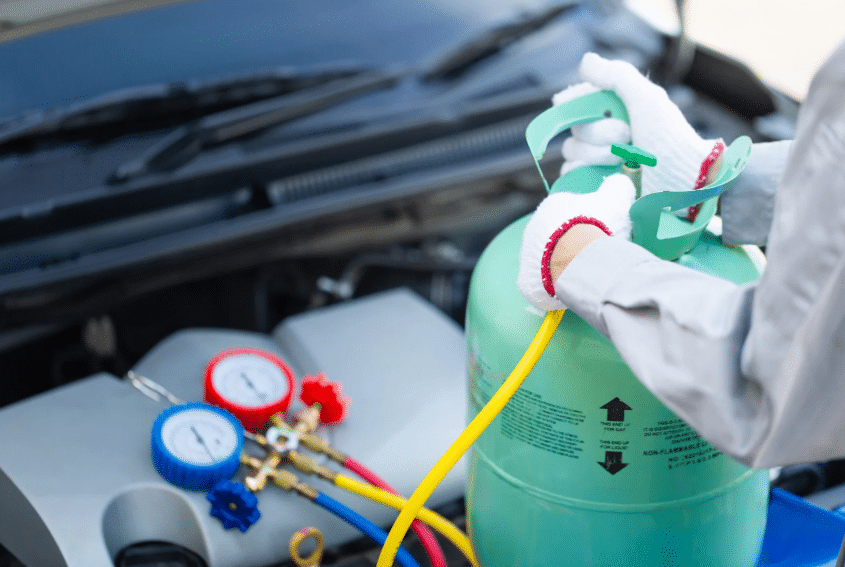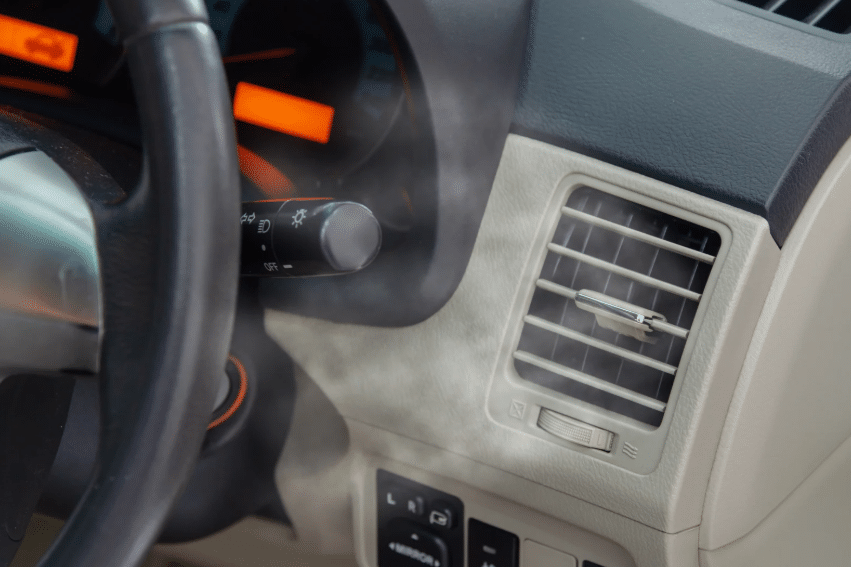How Often Do You Have to Recharge Your AC in Your Car?

Sharing this:
As summer temperatures rise, a functioning car air conditioning system becomes less of a luxury and more of a necessity. Many drivers have experienced that moment of dread when they turn on their AC only to feel lukewarm air blowing through the vents.
This often leads to the question: "How often do you have to recharge your AC in your car?" It's a common concern among vehicle owners, especially as temperatures climb. Unlike other routine maintenance, such as oil changes or tire repairs, AC recharging doesn't follow a strict mileage or schedule.
Understanding when and why your car's AC needs recharging can save you from uncomfortable drives and potentially costly repairs. In this comprehensive guide, we'll explore the factors that determine recharging frequency, signs that your system needs attention, and best practices for maintaining optimal cooling performance.
Understanding Your Car's AC System
Before diving into recharging schedules, it's essential to understand how your car's AC system works. Your vehicle's air conditioning operates as a closed system that circulates refrigerant (commonly known as Freon, though modern cars use more environmentally friendly alternatives like R-134a or R-1234YF).
The refrigerant cycles through various components, including the compressor, condenser, expansion valve, and evaporator. When functioning properly, this system doesn't consume refrigerant. Instead, the refrigerant continuously changes from liquid to gas and back again, absorbing and releasing heat in the process. This cycle is what creates the cooling effect you feel inside your vehicle.
Unlike engine oil that gets used up and needs regular replacement, refrigerant isn't meant to be depleted during normal operation. Theoretically, a perfectly sealed AC system should never need recharging. The need for a recharge typically indicates that your system has developed a leak somewhere in the closed loop.
Modern diagnostic equipment has revolutionized how automotive technicians identify these leaks. What once required lengthy manual inspections can now be pinpointed with precision using specialized tools. If your AC's cooling performance declines, it's best to schedule a professional car AC repair service to get to the root of the issue.
The Myth of Regular AC Recharging
One of the most persistent myths in car maintenance is that air conditioning systems require regular refrigerant recharging as part of routine upkeep. This misconception leads many vehicle owners to unnecessarily recharge their AC systems annually or biannually.
The truth is quite different: a properly functioning AC system should maintain its refrigerant level indefinitely. According to automotive experts, a well-maintained car AC system can go 10-15 years without requiring a refrigerant recharge. If your system needs frequent recharging, it's almost certainly due to a leak that should be addressed rather than temporarily patched with more refrigerant.
In 2022, a study by the Automotive Service Association found that approximately 85% of AC recharge services were performed on systems with detectable leaks rather than as part of necessary maintenance. Simply adding more refrigerant without addressing these leaks is not only wasteful but can potentially damage your AC system components in the long run.
Rather than focusing on a regular recharging schedule, vehicle owners should instead pay attention to their AC's performance and address any signs of reduced cooling efficiency promptly with proper car diagnostic service.
Signs Your Car's AC Needs Recharging

While there's no set schedule for recharging your car's AC, several telltale signs indicate your system might be low on refrigerant. Recognizing these symptoms early can help prevent more extensive damage and keep repair costs down.
The most obvious indicator is reduced cooling capacity. If your AC no longer blows as cold as it once did or takes significantly longer to cool the cabin, this could signal low refrigerant levels. You might notice this especially during idle times or in particularly hot weather when the system is under maximum stress.
Another common sign is the AC compressor cycling on and off more frequently than normal. The compressor has protective mechanisms that prevent it from operating when the refrigerant pressure is too low. If you hear your compressor engaging and disengaging rapidly, this could indicate insufficient refrigerant.
Some vehicles also have visible components of the AC system that can provide clues. For instance, frost or ice formation on AC lines or components often indicates a refrigerant flow problem. Similarly, visible oil stains around AC components may suggest a leak is present. This could also be a sign of a coolant leak that needs professional attention.
Modern vehicles with more advanced climate control systems might display warning lights or error messages when the AC system isn't performing optimally. These built-in diagnostic features have become increasingly sophisticated since 2020, helping drivers identify potential issues before they become major problems.
Factors Affecting AC Recharge Frequency
Several key factors influence how often your car's AC might require recharging. Understanding these can help you better maintain your system and anticipate potential issues.
- Vehicle Age: Older vehicles typically experience more frequent refrigerant loss than newer models. This is partly due to the natural degradation of rubber hoses, seals, and O-rings that occurs over time. Cars manufactured before 2010 often used different types of refrigerants and sealing technologies that are more prone to developing leaks.
- Climate and Usage Patterns: Vehicles in hotter climates, where the AC is used extensively throughout the year, experience more wear and tear on AC components. The more your system runs, the more pressure fluctuations occur, potentially accelerating the development of leaks, which is another reason to keep up with regular car maintenance.
- Quality of Previous Repairs: Perhaps surprisingly, one of the most common causes of refrigerant leaks is improper previous repairs. If a technician didn't properly seal connections or used incorrect parts during a prior AC service, this can lead to premature leaks and the need for more frequent recharging.
- Maintenance History: Vehicles that receive regular maintenance, including inspection of AC components, typically experience fewer refrigerant leaks. Preventative measures like replacing aging hoses before they fail can significantly extend the time between required recharges.
- Type of Refrigerant: Modern vehicles use different refrigerants than older models. R-134a became the standard in the 1990s, replacing the ozone-depleting R-12. Since 2015, many manufacturers have switched to R-1234yf, which has different properties and sometimes requires different system designs that can affect leak potential.
Professional Diagnosis vs. DIY Recharging
With the availability of DIY recharge kits at auto parts stores, many vehicle owners are tempted to handle AC recharging themselves. While this might seem like a cost-effective solution, there are important considerations to weigh before taking the DIY route.
Professional AC diagnosis involves more than simply adding refrigerant. Technicians use specialized equipment to detect the precise location of leaks, measure the exact amount of refrigerant in the system, and evaluate the overall health of components like the compressor and condenser. The evolution of car diagnostic services has made this process more accurate than ever, with tools that can pinpoint even microscopic leaks that would be impossible to detect with the naked eye.
DIY recharge kits, by contrast, typically only allow you to add refrigerant without addressing the underlying cause of the loss. While this might temporarily restore cooling performance, it doesn't solve the root problem. Additionally, overcharging the system is a real risk with DIY methods, which can cause significant damage to your AC components.
Cost-wise, DIY kits may cost $30–$50, while professional diagnostics range from $100–$150. However, early professional leak detection helps avoid compressor failures that cost over $1,000 to fix. If your compressor is already damaged, it may require car engine repair or more.
The Proper AC Maintenance Schedule
While refrigerant recharging isn't a regularly scheduled maintenance item, a proper AC maintenance routine can help maximize the lifespan of your system and minimize the chance of developing leaks that would necessitate recharging.
Experts recommend having your AC system inspected annually, ideally before the hot season begins. This inspection should include:
- A visual check of all accessible components for signs of wear or damage
- Performance testing to evaluate cooling capacity
- A system pressure test to identify potential leaks
- Cleaning of the condenser to ensure optimal heat exchange
- Compressor belt inspection (especially important if you’ve had issues related to oil leaks)
For vehicles over five years old, consider replacing rubber hoses and seals proactively, as these components naturally degrade over time and are common sources of refrigerant leaks. This preventative approach can be far more cost-effective than waiting for leaks to develop.
Many manufacturers recommend replacing the cabin air filter every 15,000-30,000 miles. While this doesn't directly affect refrigerant levels, a clean filter improves airflow and overall system efficiency, reducing strain on AC components.
Neglected systems reduce cooling and increase strain on the engine. For instance, an overworking AC compressor puts additional strain on your engine, potentially affecting fuel economy. Ensuring your AC system operates efficiently is part of maintaining your vehicle's overall health. For complete temperature control, trust our full car AC repair and steering and suspension repair services.
Environmental and Legal Considerations
The refrigerants used in automotive AC systems have significant environmental implications, which have led to regulations governing how these substances are handled. Understanding these considerations is important for any vehicle owner.
Modern refrigerants like R-134a and R-1234yf have less ozone-depleting potential than older types, but they still have environmental impacts. R-134a is a potent greenhouse gas with a global warming potential 1,430 times that of carbon dioxide. The newer R-1234yf has a much lower impact, but is more flammable and expensive.
Due to these environmental concerns, it's illegal in many jurisdictions to intentionally vent refrigerant into the atmosphere. This is one reason why DIY refrigerant recharging can be problematic; proper evacuation of a system requires specialized equipment that recovers the old refrigerant rather than releasing it.
Since 2020, professionals handling automotive refrigerants must be EPA-certified and use approved equipment for recovery and recycling. When you have your AC serviced by certified professionals, you're ensuring compliance with environmental regulations while also protecting the atmosphere.
Looking forward, the automotive industry continues to explore alternatives with even lower environmental impact. Some manufacturers are investigating natural refrigerants or CO2-based systems, while others are improving the efficiency of electric vehicle cooling systems that don't rely on traditional refrigerants at all.
Reach Out to Take Control of Your Car’s Cooling System

So, how often do you have to recharge your AC in your car? Ideally, never, unless there’s a leak. A well-maintained AC system should hold its refrigerant indefinitely. When cooling performance declines, always opt for proper diagnostics and leak repair, not a temporary recharge.
When your system needs attention, trust the ASE-certified technicians at Blue Ridge Automotive. Our team specializes in thorough car AC repair, car diagnostic service, and complete car maintenance to keep your vehicle road-ready. Contact Blue Ridge Automotive today to schedule a professional inspection and stay cool all season long.
Frequently Asked Questions
How much does it cost to recharge a car's AC system?
Professional AC recharging typically costs between $150-$300, depending on your vehicle model and the type of refrigerant it requires. Newer vehicles using R-1234yf refrigerant tend to be more expensive to service than older models using R-134a. This price usually includes a basic system inspection, but comprehensive leak detection may incur additional costs. While DIY kits are available for $30-50, they don't address underlying issues and may lead to more expensive repairs later.
Can I drive my car if the AC isn't working properly?
Yes, you can safely drive your vehicle with a malfunctioning AC system. Unlike your engine cooling system, the AC doesn't affect your car's mechanical operation or safety systems. However, driving in extreme heat without AC can lead to driver fatigue and reduced concentration, potentially creating an indirect safety concern.
If your AC compressor is making unusual noises or has seized, it's best to have it checked immediately, as a damaged compressor can affect other engine components if it shares the same drive belt.
How can I tell if my car needs AC refrigerant or has another AC problem?
Reduced cooling performance could be caused by low refrigerant, but also by issues like a faulty compressor, blocked condenser, or electrical problems. If your AC blows cold initially but then warms up, this often indicates low refrigerant. If it never cools at all, the issue might be electrical or mechanical.
Unusual noises when the AC is on typically point to compressor problems rather than refrigerant levels. A proper diagnosis by a qualified technician using specialized equipment is the most reliable way to determine the exact cause of AC problems.
Will adding refrigerant fix my car's AC if it's not cooling properly?
Adding refrigerant will only improve cooling if low refrigerant is the sole issue. If your system has a leak (the most common reason for low refrigerant), adding more will provide only temporary relief before the newly added refrigerant also escapes.
Other issues like a malfunctioning compressor, a clogged expansion valve, or a failed blower motor won't be resolved by adding refrigerant. For lasting repairs, it's essential to identify and fix the root cause rather than simply "topping off" the system.
How long should refrigerants last in a car air conditioning system?
In a properly sealed system with no leaks, refrigerant should last indefinitely. Modern vehicles are designed to maintain their refrigerant charge for the lifetime of the vehicle. If your car needs refrigerant more than once every several years, this indicates a leak that should be repaired.
Statistical data from 2023 shows that properly maintained AC systems in vehicles manufactured after 2015 retain over 95% of their refrigerant charge after five years of normal use, demonstrating that frequent recharging is unnecessary with proper maintenance.



